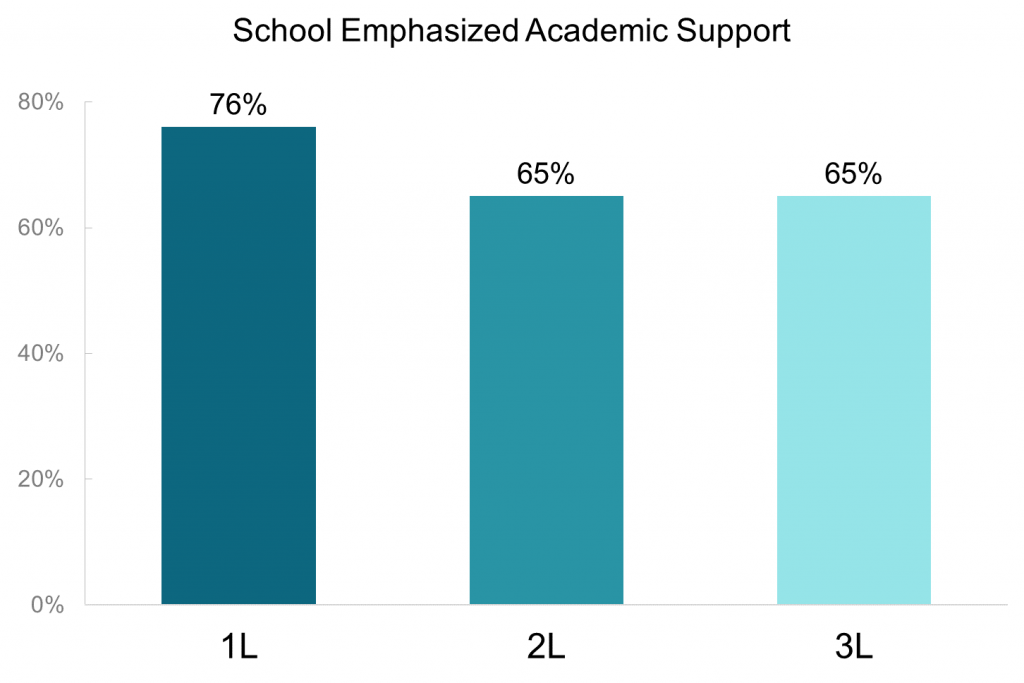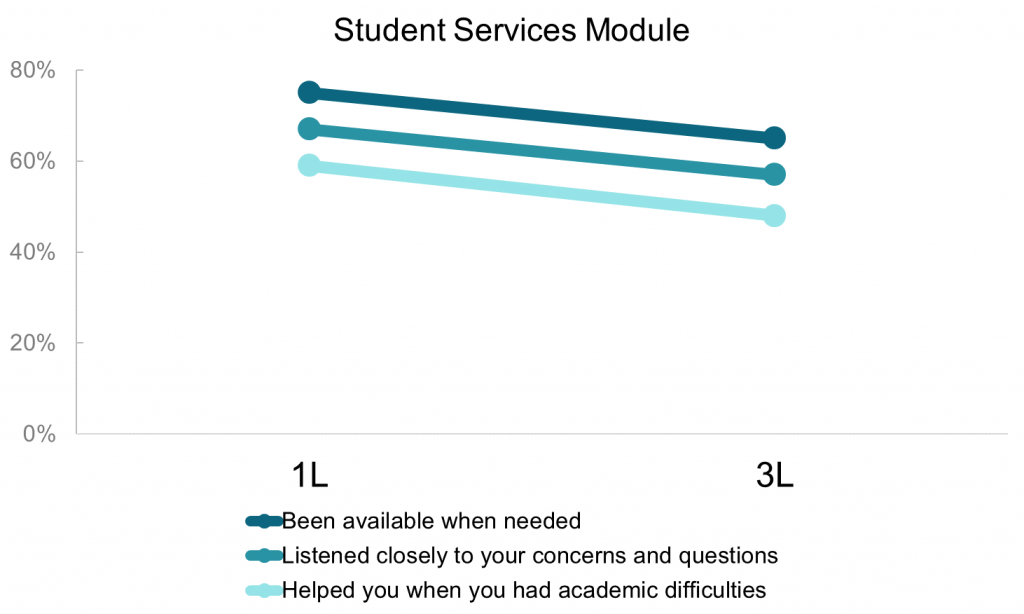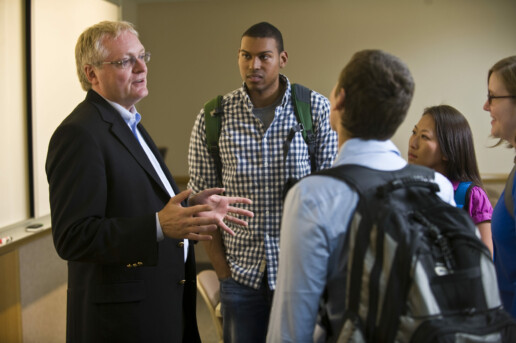Evolving Support for Law Students: 20 Years of LSSSE
The 2024 LSSSE annual report 20 Years of LSSSE is now available on the LSSSE website. Our previous post examined trends in law student demographics. In this post, we will share some trends in student support services, both in terms of satisfaction with formal law school student services offices and relationships with faculty and staff.
A large part of overall student satisfaction with law school is likely due to strong bonds with others on campus. Student relationships with faculty and classmates have been compellingly positive over the past twenty years. Throughout the past two decades, over three-quarters (76-81%) of law students have consistently rated their relationships with classmates as five or higher on a seven-point scale. Peer relationships are the only ones to have remained in 2024 at the high levels of 2019, showing these bonds quickly recovered from any potential pandemic-related decline. Students also report strong bonds with professors. Roughly three-quarters (73-78%) of LSSSE respondents from 2004 to 2024 have rated relationships with faculty as positive, measured as five or higher on a seven-point scale. Though the current 73% of students reporting strong relationships with their professors is slightly down from 2019 levels (76%), it nevertheless remains high. Relationships between students and staff, on the other hand, are more concerning. From 2004 to 2019, roughly two-thirds (65-68%) of law students reported positive relationships with staff; in 2024, this figure dropped to 59%. While student-staff connections have never been as strong as those between students and faculty or students with peers, those reported in 2024 are the lowest ever recorded, revealing room for significant improvement in these relations post-pandemic.
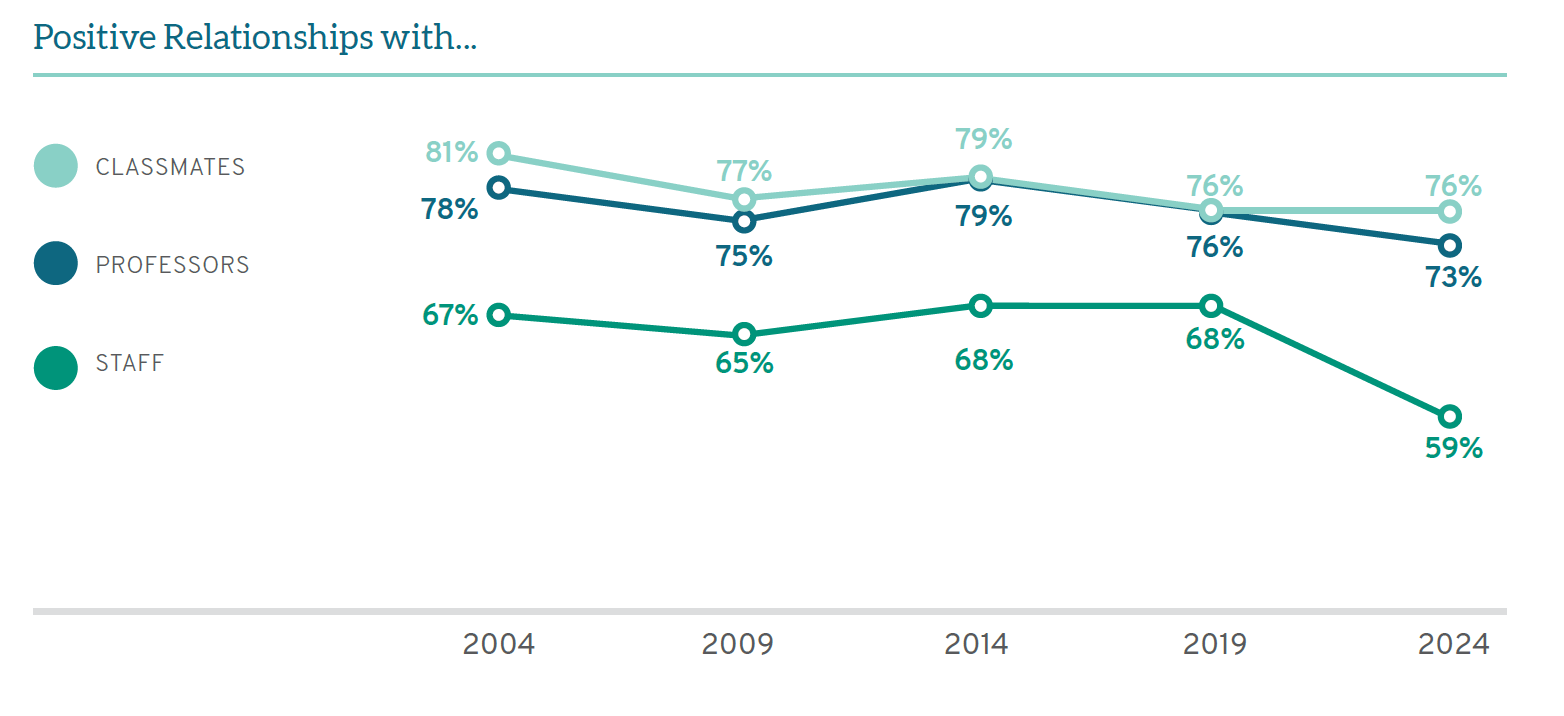
Because staff have many opportunities to interact with students in response to various issues, each contact provides an opportunity to strengthen bonds between them. Between 2004 (61%) and 2019 (71%), there were steady increases in satisfaction with academic advising; however, the percentage of law students reporting they were “satisfied” or “very satisfied” dropped to 64% in 2024. Whether due to COVID-19 or other reasons, student satisfaction with academic advising declined over the past five years, instead of continuing the steady progress it enjoyed through 2019. Because the percentage of students using academic advising remains particularly high (90-94% in the past decade), positive interactions with academic advising staff could be instrumental in improving student-staff relationships overall.
Most students also partake in advising opportunities with career services staff, including 87-92% of all students over the past twenty years. Though only half (51%) of students were “satisfied” or “very satisfied” with career counseling in 2004, that percentage also steadily increased over time for fifteen years through 2019. However, as with other staff services, the upward trend has stopped, with current student satisfaction with career counseling (64%) matching 2014 levels, down from 69% five years ago.

Satisfaction with personal counseling sessions also enjoyed incremental increases over time for fifteen years, from a low of 57% in 2004 to 65-67% in 2009 and 2014, to a high of 68% in 2019. Troublingly, satisfaction has dropped significantly in the past five years, down to only 60% of students who are “satisfied” or “very satisfied” with the personal counseling they receive. Although the myriad challenges of the pandemic and other upheavals in legal education and society writ large may suggest personal counseling is all the more necessary for law students today, only 60% used these services in 2024 (another drop from 68% who sought personal counseling in 2019).
Students also reported lower levels of satisfaction with job search help in 2024 than they did in 2019, with only 61% reporting they were “satisfied” or “very satisfied” with these services. Again, this reveals a break in the trend of increasing satisfaction with job search help from 2004 (49%) through 2019 (66%). The good news is that roughly the same percentage of students (83-85%) over the past decade have sought assistance with their job search; thus, opportunities remain to improve these interactions over time.
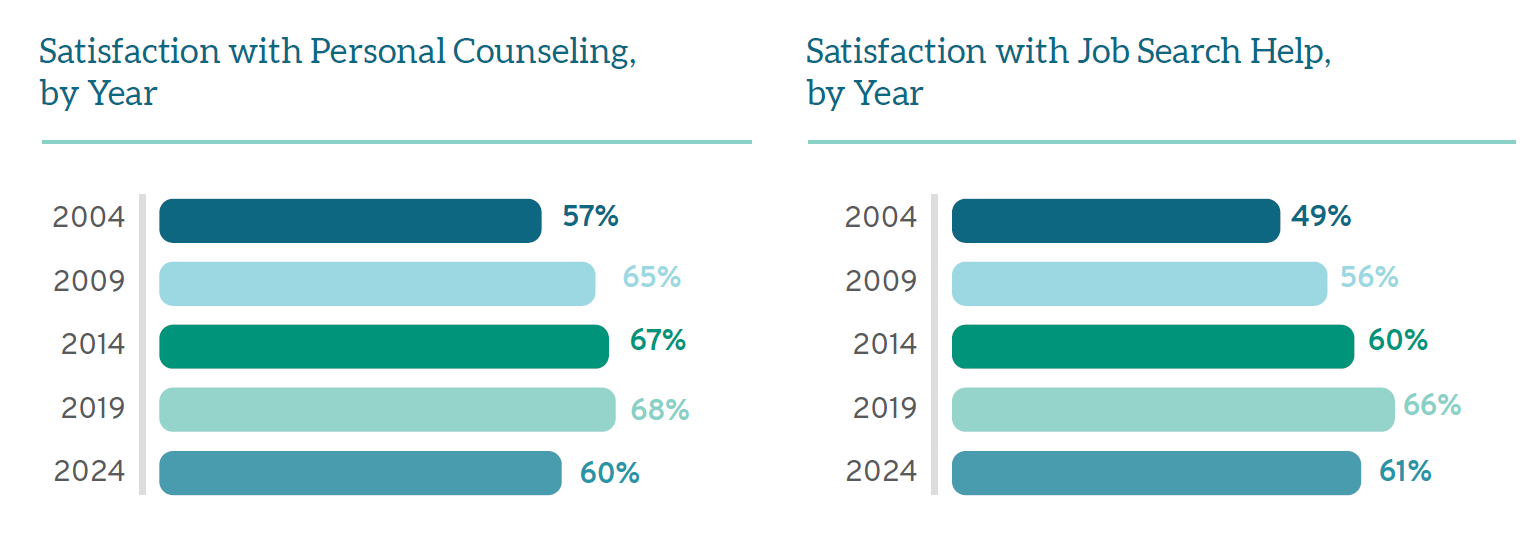
For more information on how the law student experience has changed over time, including overall satisfaction and trends in student debt, please visit the LSSSE website to read the entire report.
Meaningful Sources of Career Advice for Law Students
Navigating career decisions can be one of the most challenging aspects of law school, and many students find themselves seeking advice to chart their path forward. Whether considering judicial clerkships, corporate law roles, public interest positions, or alternative legal careers, law students often feel a mix of excitement and uncertainty. Balancing academic demands with the pressure to make strategic choices about internships, networking, and future goals requires careful planning. And the guidance of mentors, professors, and peers can make all the difference.
Using 2023-2024 data from the LSSSE Student Services module, we examined the meaningful sources of career advice that law students draw upon to help with professional preparation. Interestingly, law students are more likely to seek out career advice from faculty or staff members not formally assigned as career advisors rather than from formal career advisors at their law school. Only about a third of law students receive meaningful advice from careers advisors available to any student, and only about a quarter receive meaningful advice from a career advisor assigned to them, which is equal to the percentage of students receiving meaningful advice from family members (26%).
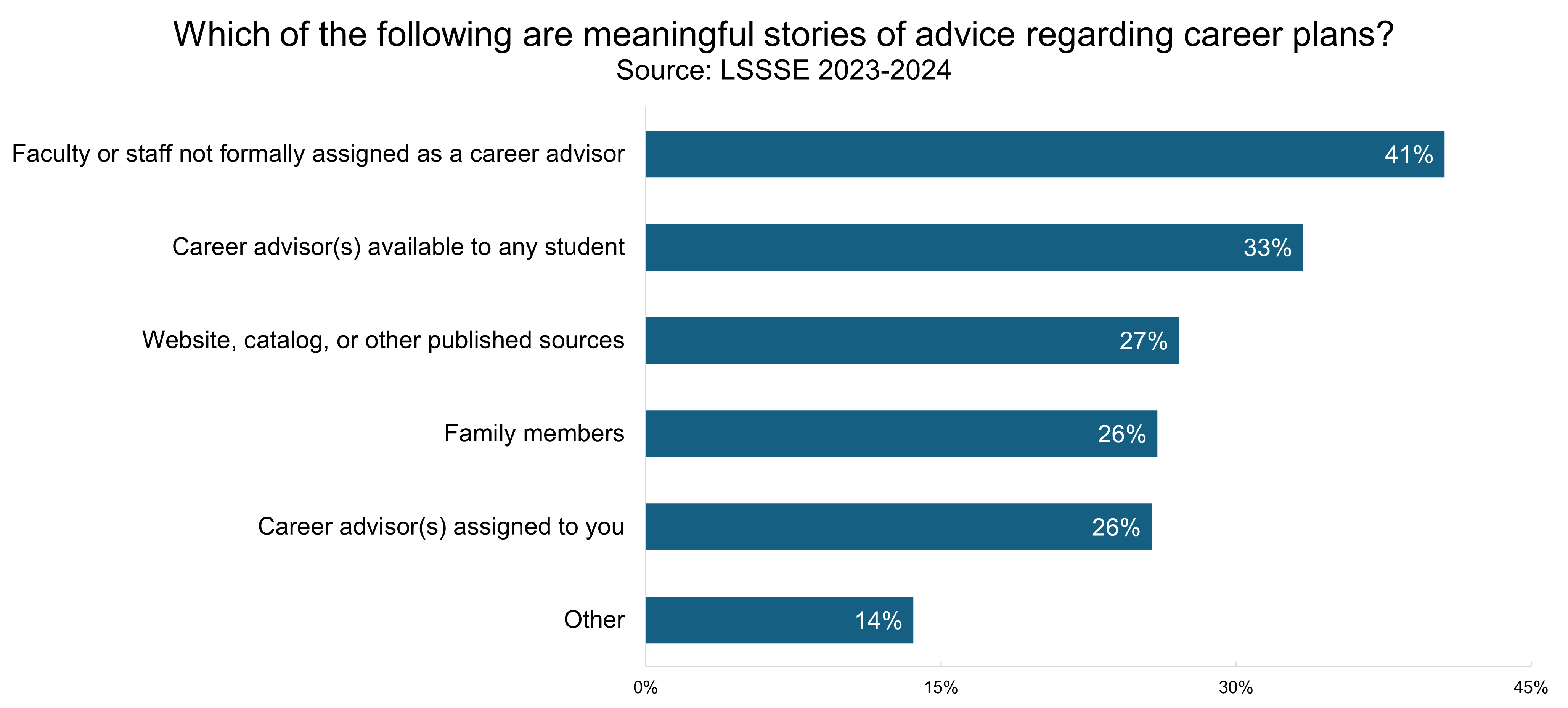
Given that family input will vary widely across different student backgrounds, we compared the sources of career advice for first-generation and non-first-generation law students. For first-generation law students (those who do not have a parent with at least a bachelor's degree), family members are much less likely to be a meaningful source of career advice. However, troublingly, first-generation students are also less likely to receive meaningful career advice from other sources relative to their non-first-generation peers. In other words, law schools may not be filling the gaps for first-generation students to support their transition into the legal profession.
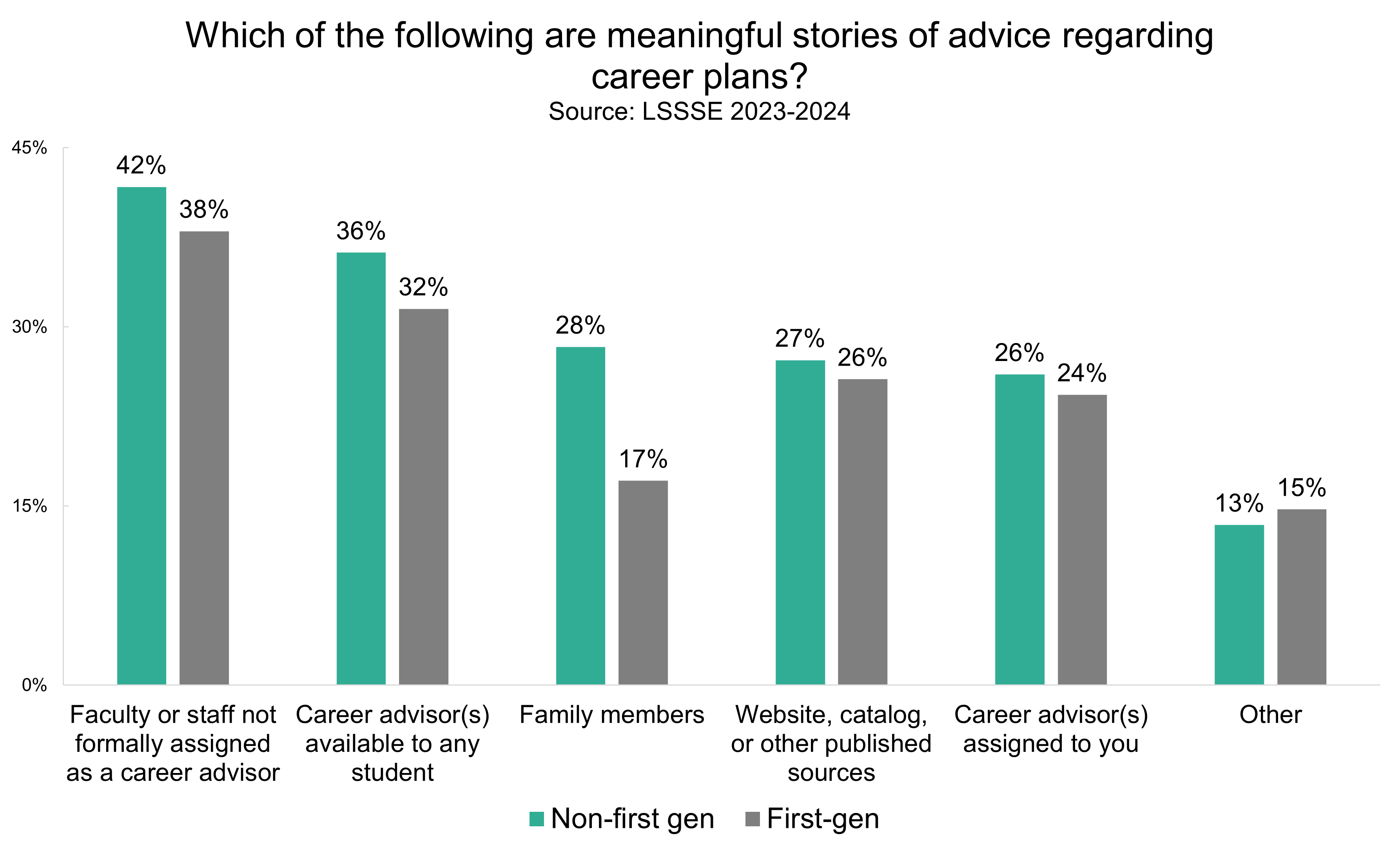
Digging deeper into the non-first-generation data, we wanted to know what impact having a parent with a law degree has on students’ sources of meaningful career advice. Among students who have a parent with a doctoral or professional degree, we see, not surprisingly, that students who have a parent with a JD are more likely to cite family members as a meaningful source of career advice than students who have a parent with a non-JD doctoral or professional degree. However, only around half (52%) of law students who have a parent with a JD note that they are receiving meaningful career advice from a family member. The students with a JD-holding parent are a little more likely to get advice from career advisors assigned to them and a little less likely to receive advice from faculty, staff, or career advisors who are not formally assigned to them.
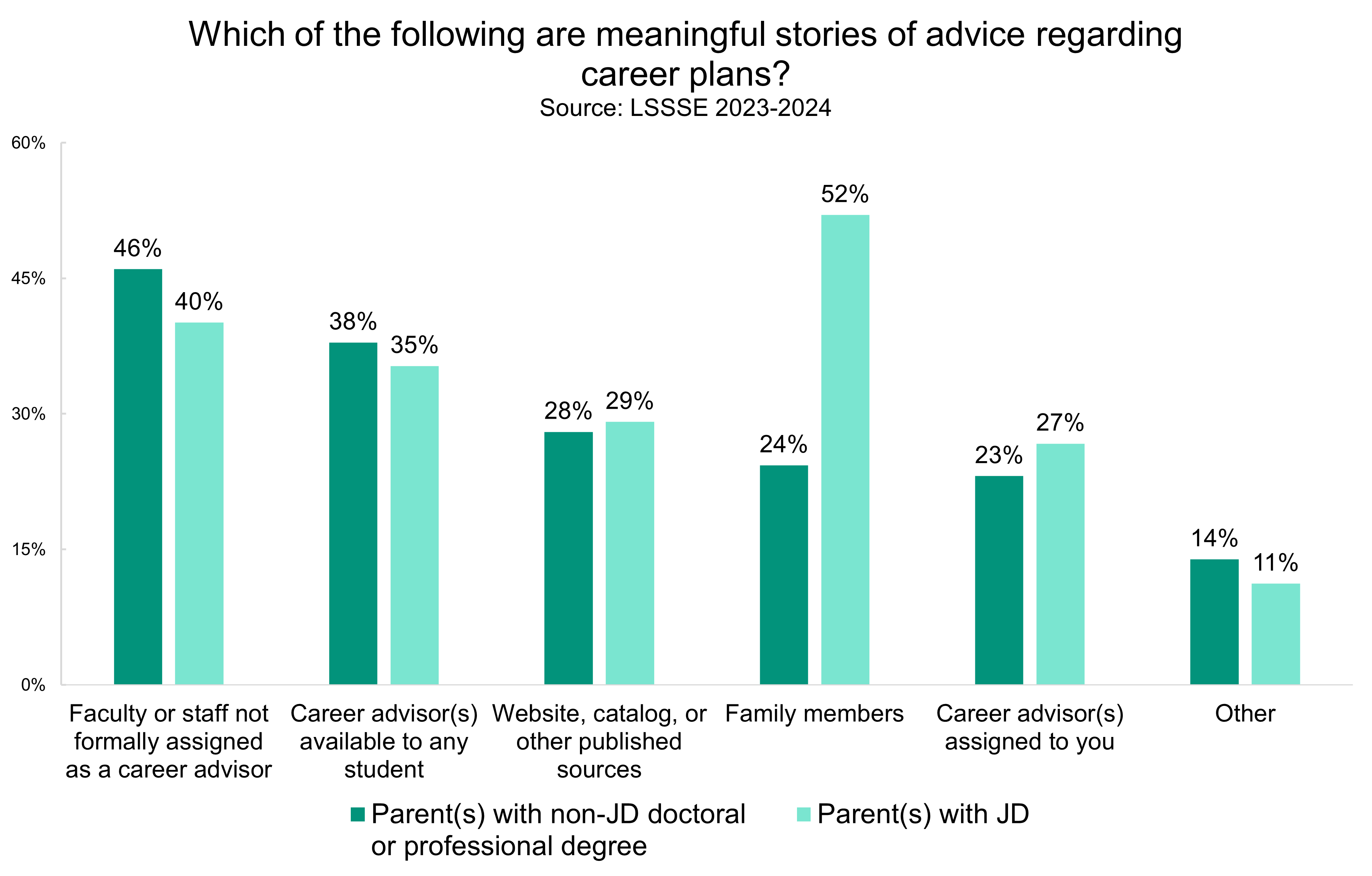
These findings highlight critical gaps and opportunities in how law schools support students in their career preparation. While informal networks and personal relationships with faculty or staff often play a vital role, the data suggest that formal career advising structures may not be as effective as they could be, particularly for first-generation students. Law schools should consider rethinking how they engage with students in career advising, ensuring that resources are accessible and tailored to meet the diverse needs of their student body. By strengthening these systems and bridging the advice gap, particularly for those from underrepresented backgrounds, law schools can better prepare all students for the challenges and opportunities of the legal profession.
The Changing Landscape of Legal Education: High Levels of Satisfaction
In spite of many challenges, law students report relatively constant positive levels of satisfaction with legal education over the last decade and a half. Our 2020 special report The Changing Landscape of Legal Education: A 15-Year LSSSE Retrospective shares longitudinal findings on select metrics as well as demographic differences within variables to catalog how legal education has changed over time. In this blog post, we highlight the remarkably high levels of satisfaction that students have expressed about their law school experience since LSSSE’s inception.
When students were asked, “How would you evaluate your entire educational experience at your law school?” over eighty percent of all law students rated their experience as at least “good” with roughly one-third of all students saying they have enjoyed an “excellent” law school experience.

If we consider student satisfaction with a number of different encounters—including academic advising, career counseling, personal counseling, and job search help—we see a consistent pattern of improvement over fifteen years. While over half (53%) of students who sought out academic support were “satisfied” or “very satisfied” with advising and planning in 2004, that number grew to almost three quarters (71%) of all students by 2019. Interestingly, there are also more students using academic advising and planning today than in years past: a full 94% of students used those services last year.
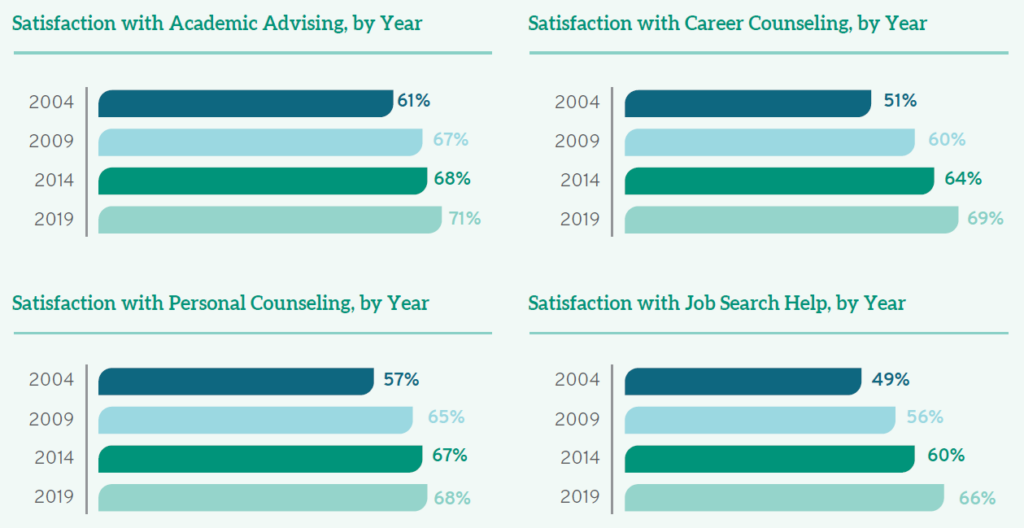
Students also appreciate how the significant investment of career counselors improves their professional prospects. While fifteen years ago, 51% of students were satisfied with career counseling (and 9.9% of these were “very satisfied), satisfaction has grown steadily over time with 60% satisfied in 2009, 64% in 2014, and a remarkable 69% satisfied in 2019 (with 22% of those noting they are “very satisfied”). As with academic advising, higher percentages of students are taking advantage of career counseling—only 8.0% of students in 2019 did not use this service (compared to 15% in 2004).
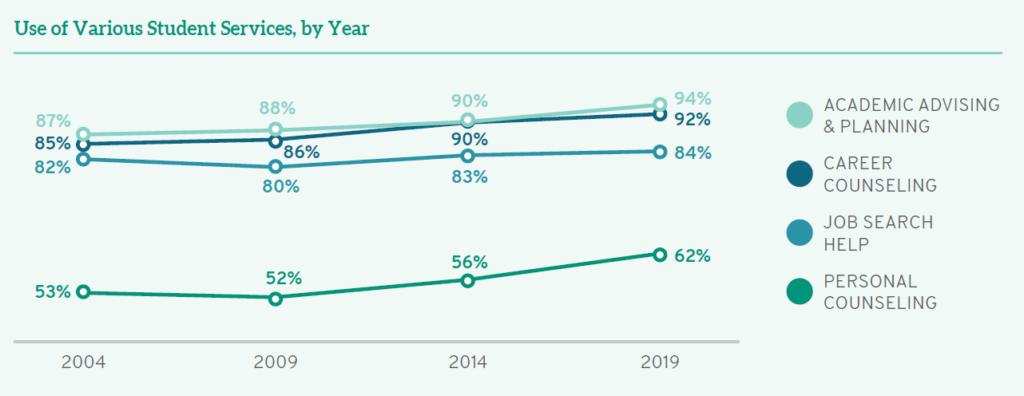
The vast majority of students sought assistance with the job search in 2004 and in subsequent years. While almost half (49%) of students were satisfied with staff efforts to provide job search help in 2004, those numbers have increased over time to 56% in 2009, 60% in 2014, and now to 66%. Although there is room for improvement, students are noticing and appreciating improvement over time.
The Changing Landscape of Legal Education: Positive Learning Outcomes
Over the past fifteen years, LSSSE has documented dramatic changes in legal education. From 2004 to 2019, the changing landscape of law school was punctuated by increasing diversity among students, rising debt levels, relative consistency in job expectations, and improvements in various learning outcomes. In spite of many challenges, law students nevertheless report relatively constant positive levels of satisfaction with legal education overall. Our 2020 special report The Changing Landscape of Legal Education: A 15-Year LSSSE Retrospective shares longitudinal findings on select metrics as well as demographic differences within variables to catalog how legal education has changed over time. In this blog post, we will share how students have increased their achievement of selected learning outcomes from 2004 to 2019.
According to LSSSE data, law schools contributed to increases in a variety of perceived learning outcomes from 2004 to 2019; collectively, these point toward progress in terms of how students measure their own skills and likely in terms of actual practice-readiness of graduates. In 2004, only 23% of students saw their schools as doing “quite a bit” or “very much” to help them understand people of other racial and ethnic backgrounds; because of steady increases over the next fifteen years, especially between 2009 and 2014, almost half (45%) of students today see their schools as doing “quite a bit” or “very much” to prepare them to interact with racially diverse colleagues and clients.
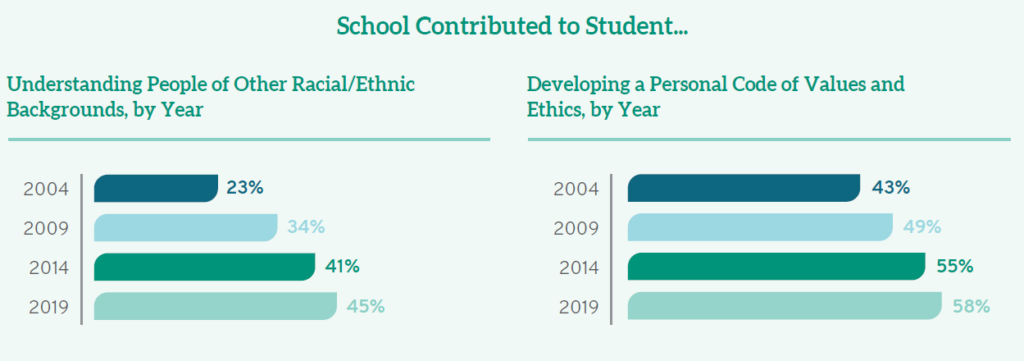
In addition, schools have increased their emphasis on professional responsibility in the past fifteen years. While even in 2004 a full 43% of students saw their schools as doing “quite a bit” or “very much” to encourage them to develop a personal code of values and ethics, that number has now grown to 58%. Schools were already prioritizing complex problem solving fifteen years ago, and students see institutional support for this skill growing over time as well. While in 2004, 12% of students believed their law schools contributed “very much” to their ability to solve “complex real-world problems,” that percentage has doubled over fifteen years so that now almost a quarter (24%) of students agree. Law schools are also encouraging students to focus on developing career goals and aspirations. In 2004, almost a quarter (23%) of all law students saw their schools doing “very little” to contribute to their developing clearer career goals; by 2019 those statistics dropped to 14%. On the flip side, while only 11% saw their schools doing “very much” in this regard in 2004, that number has risen steadily, reaching 22% in 2014 and remaining there in 2019.

Looking at the past can help prepare us for our future. To learn more, you can read the entire Changing Landscape report here.
Where do students get advice?
LSSSE’s optional Student Services module asks students about whether and how often they access academic and career services. Students draw from various sources to get advice about law school, legal education, and their future careers. Here, we look at the most commonly selected meaningful sources of advice for students and examine how patterns of advice-seeking change as students progress through law school.
Advice about Academic Plans
Faculty or staff not formally assigned as an academic advisor are the most common meaningful source of advice about academic planning. Over 40% of LSSSE respondents rely on these personal relationships that they develop with the law school professionals around them. Formal academic advisors –those assigned and those available to any students – are the second and third most commonly used sources of advice and were selected by 26% and 23% of students, respectively. About 22% of students consider websites, catalogs, or other published sources to be meaningful sources of advice about academic plans, and roughly one in five consulted family members. Only 14% of respondents did not seek academic advice from anyone during the current school year.
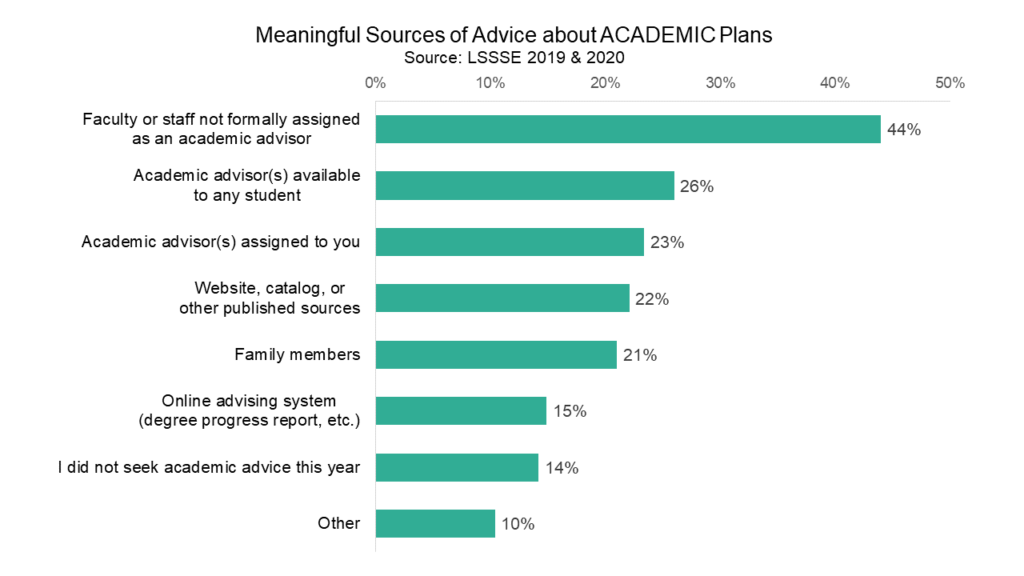
Students appear to rely less on assigned academic advisors as they progress through law school. Roughly one-third of 1L students say their assigned academic advisor was a meaningful source of advice, but only 15% of 3L students feel the same way. Perhaps unsurprisingly, 3L students were slightly less likely to seek academic advice than 1L and 2L students.
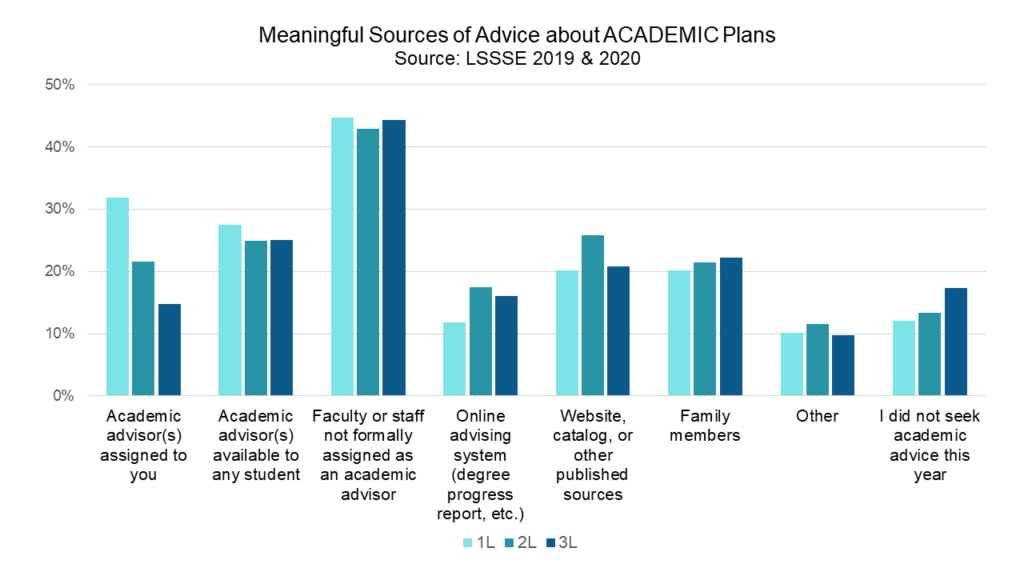
Advice about Career Plans
The ranking of meaningful sources of advice about career planning is remarkably similar to the ranking for advice about academic planning. Students highly value their relationships with law school faculty and staff when it comes to seeking career advice, ranking faculty or staff not formally assigned as a career advisor highest (38%), followed by career advisors available to any student (35%) and then assigned career advisors (27%). Interestingly, students were equally likely to select family members and assigned career advisors as meaningful sources of career advice. Twelve percent of respondents did not seek any career advice during the current school year.
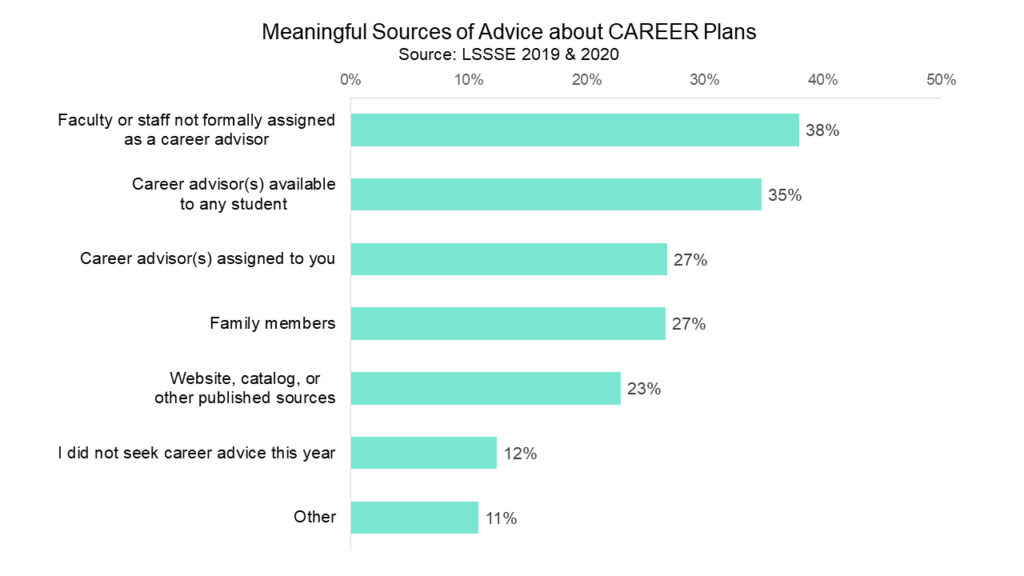
Students rely less on assigned career advisors as they progress through law school, which is similar to the pattern we saw for academic advising. However, the gradual decrease in reliance on formal career advising is somewhat mirrored by a gradual increase in reliance on advice from faculty or staff not formally assigned as career advisors. It would appear that as students refine their interests and form relationships with particular faculty or staff members, they start to rely more on personal relationships for career advising and less on relationships facilitated by the structure of law school.
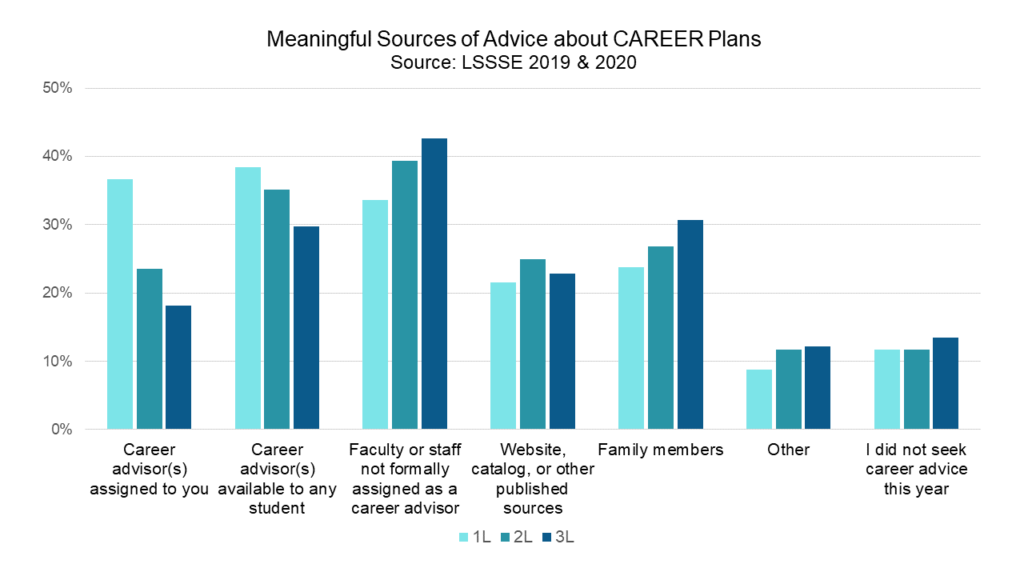
Annual Results 2018: Relationships Matter – Advising
A majority of students are pleased with the quality of advising and their relationships with administrators:
- 69% are satisfied with academic advising and planning.
- 66% are satisfied with career counseling.
- 64% are satisfied with job search help.
- 70% are satisfied with financial aid advising.
- 68% report that administrative staff are helpful, friendly, and considerate.
The quality of relationships with advisors and administrators is both positive and relatively consistent across race, gender, and year in school. Seventy percent of 1L students (and 67% of 2Ls and 3Ls) report that administrative staff are helpful, considerate, and flexible. Seventy-nine percent (79%) of students consider at least one administrator or staff member as someone they could approach for advice or guidance on managing the law school experience. Higher percentages of Black students (87%) rely on these relationships than students from other racial backgrounds (79% for Asian American, white, and Latinx students).

Interactions with academic support personnel drive whether a student would choose to attend the same law school again as well as overall satisfaction with their law school experience. Though students report positive relationships with administrative staff, satisfaction with advising services is less consistent and more varied across race/ethnicity, year in school, and gender. Sixty-nine percent of all respondents report that their law school provides the support they need to succeed academically, with higher perceptions of support among 1L students. Similarly, academic advising, career counseling, and job search help are key support services that students appreciate greatly when they begin law school, though they are more dissatisfied as graduation nears.
